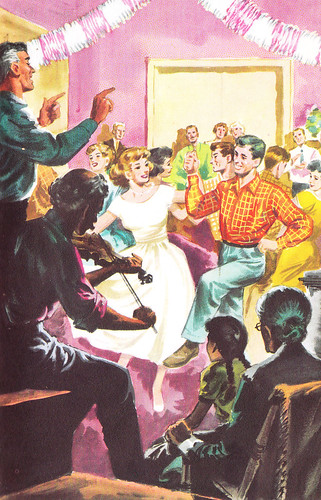Another season of Downton Abbey is ending, which means another batch of our favorite Downton Abbey words.
The fifth season (or series, the British way) takes place in 1924. Vladimir Lenin has died, Gershwin’s Rhapsody in Blue was performed for the first time, and Calvin Coolidge was elected President of the U.S.
Meanwhile, over in Yorkshire, meaningful glances were exchanged, acerbic quips quipped, and anachronisms dropped (we noticed three and a half). Pour yourself a cuppa and enjoy.
brownshirts
Edith: “Apparently, there’s a trial going on in Munich of the leader of a group of thugs there.”
Lord Grantham: “I read about this. They wear brown shirts and go around bullying people. They even tried to start a revolution last year.”
Episode 4, January 25, 2015
The brownshirts refer to members of the Nazi SA, or Sturmabteilung, who wore brown uniforms.
The Sturmabteilung, also known as Storm Detachment or Assault Division, was the “original paramilitary wing of the Nazi Party,” and “played a key role in Adolf Hitler’s rise to power in the 1920s and 1930s.”
cocktail party
Mary: “It’s very daring of the Lord Lieutenant to give a cocktail party. What do you think, Carson?”
Episode 5, February 1, 2015
Anachronism alert! While this episode takes place in 1924, the term cocktail party, according to the Oxford English Dictionary (OED), originated in 1928. The earliest recorded citation from is D.H. Lawrence: “She almost wished she had..made her life one long cocktail party and jazz evening.”
However, it’s possible that the term was in use a few years before Lawrence used it in Lady Chatterley’s Lover since the word cocktail referring to a mixed alcoholic drink was coined in the early 1800s.
crofter
Mary: “What is your main objection to Mr. MacDonald? That the Prime Minister is the son of a crofter?”
Episode 1, January 4, 2015
A crofter is a tenant farmer, and a croft, as you might have guessed, a tenant farm. According to the OED, the word crofter is from the 18th century while croft is much older, originating in the 10th century. They both come from the Dutch kroft, “prominent rocky height, high and dry land, field on the downs.”
The “Mr. MacDonald” Mary refers to is James Ramsay MacDonald, Britain’s first ever Labour Party Prime Minister. His working class background — MacDonald “studied and worked his way from a village to London and from manual labor to a political career” — was at the time unusual for a politician.
electrotherapy
Thomas: “I went to London for what they call electrotherapy, and the pills and injections were supposed to continue the process.”
Episode 6, February 8, 2015
Electrotherapy is medical treatment using “electric currents.” The practice, used for everything from neurological disease to wound healing, was first developed in 1855 by French neurologist Guillaume Duchenne.
While electric shocks were used starting in the 1960s in homosexual conversion therapy, we couldn’t find, in at least a cursory search, the use of electrotherapy in the kind of conversion therapy Thomas is attempting in 1924.
In 1920, Sigmund Freud wrote in a paper that “changing homosexuality” would be difficult as it “was not an illness or neurotic conflict.” In 1935, Freud called homosexuality merely a “variation of the sexual function.”
Ellen Terry
Lady Grantham [to Isobel]: “Ellen Terry has nothing on you when it comes to stringing out a moment.”
Episode 5, February 1, 2015
Ellen Terry was an English stage actress known for her Shakespearean roles. Above is a painting by John Singer Sargent of Terry in perhaps her most famous role, Lady Macbeth.
fit as a flea
Rosamunde: “She’s just very tired. She’ll be fit as a flea tomorrow.”
Episode 5, February 1, 2015
Fit as a flea is an idiom meaning “in good health,” and originated around the 1880s, says the OED.
While the phrase probably plays off as fit as a fiddle, which came about in the 17th century, we don’t know why fleas would be considered hale, except perhaps because of their energetic jumping abilities.
So what does a fiddle have to do with being fit? Fit hasn’t always just meant healthy. In the 16th century, the word meant “possessing the necessary qualifications” and “in suitable condition,” according to the OED. So, presumably, a fiddle that was fit meant that it was fit for playing. It was around 1869 that fit came to mean being in good physical condition.
like billy-o
Lord Grantham: “But darling, you don’t want to rush into anything.”
Rose: “But I do. I want to rush in like billy-o.”
Episode 7, February 15, 2015
Like billy-o is an intensive phrase similar to like the devil, says the OED, and originated around 1885.
But where it comes from is less clear. While the town of Maldon in Essex attributes the saying to Joseph Billio, a minister who arrived in 1696 to build a chapel there, World Wide Words says the phrase billy-o arrived too long after the minister Billio, and that a connection is unlikely.
Other possible origins include “Lieutenant Nino Bixio, an Italian soldier at the time of Garibaldi (whose name was said a little like billy-o)”; Puffy Billy, industrial engineer William Hedley’s early steam engine; or Good King Billy, William III of England.
Marie Stopes
Mary [to Anna]: “I have a copy of Marie Stopes’s book. Tells you everything.”
Episode 2, January 11, 2015
Marie Stopes was a campaigner for women’s rights and “pioneer in the field of birth control.” While her most well-known publication is Married Love: Or, Love in Marriage, the book Mary is referring to is probably Wise Parenthood: A Book for Married People, which describes the diaphragm Mary asks poor Anna to purchase for her:
The best appliance at present available for [closing the minute entrance of the womb] is a small rubber cap, made on a firm rubber ring, which is accurately fixed round the dome-like end of the womb…and should be procurable from any first class chemist.
mumsy
Rose [modeling a dress]: “You don’t think it’s a bit mumsy?”
Episode 8, February 22, 2015
Another anachronism! While mumsy has been in use since the 1870s as a childish imitation of mum or mummy, says the OED, the word meaning motherly, homely, or conventional didn’t originate until 1961.
(one’s) thing
Edith: “I thought you’d gone with them.”
Tom: “No, I have a lot to do. And to be honest, it’s not really my thing.”
Episode 6, February 8, 2015
While it may seem quite modern to use a possessive pronoun with thing to mean something one is interested in, the construction has been around since at least the 1930s, according to the OED: “If pottery’s your thing. Mountains are not my thing. The sea is my thing.”
But of course since this episode takes place in 1924, the phrase is still an anachronism.
shell shock
Mrs. Hughes: “Mr. Carson, surely by now we know enough about shell shock to be more understanding than we were at the start of the war.”
Episode 3, January 18, 2015
Shell shock is also known as combat fatigue, or “posttraumatic stress disorder resulting from wartime combat or similar experiences.” According to the OED, the term combat fatigue originated in the early 1940s.
The OED describes shell shock as a disorder identified specifically in soldiers from World War I, with the earliest recorded citation from 1915:
Only one case of shell shock has come under my observation. A Belgian officer was the victim. A shell burst near him without inflicting any physical injury. He presented practically complete loss of sensation in the lower extremities and much loss of sensation.
While the usage of shell shock spiked in 1920, both shell shock and combat fatigue leveled off after World War II, and the term PTSD, or post-traumatic stress disorder, rose sharply after the early 1980s.
small beer
Carson: “This is very small beer.”
Mrs. Patmore: “Mr. Carson, it’s my kind of beer and I know how to drink it.”
Episode 5, February 1, 2015
The phrase small beer originated in the 15th century, says the OED, and referred to beer that was weak or of inferior quality. About two hundred years later, the phrase came to mean something unimportant or trivial, as first used by Shakespeare in Othello: “To suckle fooles, and chronicle small Beere.”
To think small beer of means “ to have a poor or low opinion of (oneself or others),” while a small-beer chronicle is “a narrative of trivial, usually domestic, events.”
sympathy butters no parsnips
Mr. Carson: “I don’t want you think I’m unsympathetic.”
Mrs. Patmore: “Yes, well, sympathy butters no parsnips.”
Episode 3, January 18, 2015
Sympathy butters no parsnips is a variation on the saying, fine words butter no parsnips, which means fine words achieve nothing.
The phrase comes from the historically British practice of generously applying butter to most foods, including parsnips, apparently “much to the disgust of the French” as well as to the Japanese, who referred to Westerners as bata kusai, or butter-stinkers.
tin-pot
Lord Grantham: “So every time we entertain, we must invite this tin-pot Rosa Luxemburg?”
Episode 2, January 11, 2015
Something or someone tin-pot is unimportant, inferior, or shoddy, the way tin is considered an inferior or shoddy metal. Rosa Luxemburg was a revolutionary socialist who co-founded the Communist Party of Germany.
yummy
Mary: “He looks after the pigs.” [Focuses on a dress.] “Oh, yummy.”
Episode 4, January 25, 2015
Yummy meaning delicious or delectable might be a bit of an anachronism. While in 1899 Rudyard Kipling uses the word — “Kissy! come, come!.. Yummy-yum-yum!” — it might just be a play on the word yum meaning “an exclamation of pleasurable anticipation,” as per the OED.
The OED’s first post-1899 citation of yummy is in 1934 as a listing in Webster’s New International Dictionary of English Language, and then in 1950: “Lora’s attractive face or Dorothea’s yummy figure.”
[Image via PBS]






